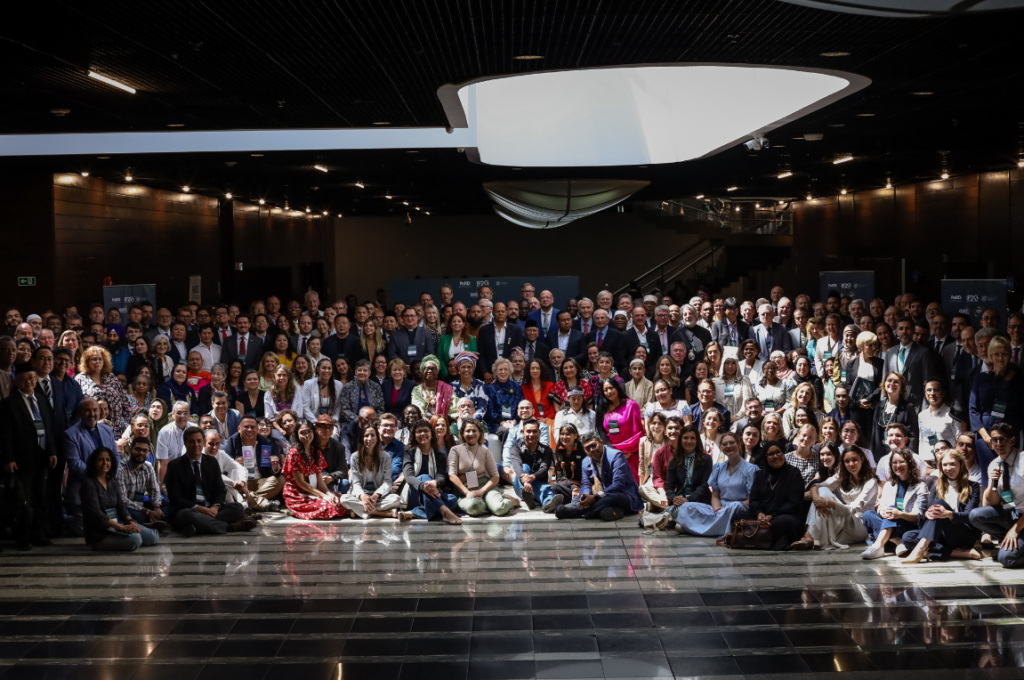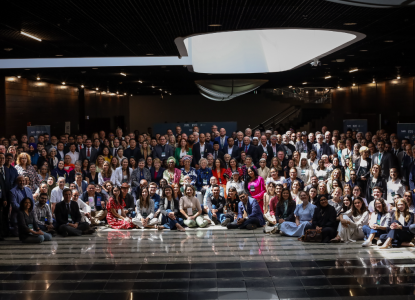By Ebrahim Rasool
In August, 2024, at the G20 Interfaith Forum in Brasilia, Ebrahim Rasool delivered a thought-provoking speech titled “Provocations.” Rasool, a prominent South African politician and diplomat, challenged the interfaith community to confront difficult truths and examine its role in addressing global crises. This blog post presents Rasool’s five provocations, which urge religious leaders to move beyond moral clarity to moral courage in tackling issues such as inequality, environmental degradation, and social phobias. His words serve as a call to action for faith communities to reimagine their approach to global challenges and speak truth to power.
– – –
I want, in my five minutes, to put forward five provocations. And I use the word provocation, because I’m committed to the idea of leaving no one behind, but I fear that it is embedded in our systems and structures to leave people behind. And therefore it can’t be a nice conversation. It has to be a provocative conversation, and we need to interrogate whether religion and faith is the doctor or the patient or both.
We are a generation of religious leaders who have inherited a unique set of intersecting crises. We all enjoy the mobility of capital and goods. But we often don’t understand the unprecedented poverty and inequality that is embedded in the economic crisis that has been created. We enjoy the technology and the innovation, but we don’t always link it to the degradation of the planet and the natural world. We revel in the knowledge and the science that is there, but it also erodes the historic and traditional anchors that people have had in faith and in culture and in their own traditions.

We have an ambiguous relationship when people are mobile, where people too can choose to move, whether forced or whether seeking a better life, and when people exercise their mobility to move.
We have seen the production of an unprecedented number of isms and phobias In the last while we have created a phobia for every type of people or an ism for every prejudice we have, whether it is racism, misogyny, anti-Semitism and homophobia, Islamophobia, xenophobia, and every other ism and phobia you can think about. What has happened? And sometimes the religious world is complicit in it.
We have now entered a frightening competition for victimhood. Who are the greatest victims of this crisis ridden world that we are in? Because we are all victims. But when we compete for victimhood, we don’t simply want to be the worst victim of life. We want to be the worst victim because that victimhood gives us a license for impunity and an avoidance of accountability. We want to say that as we were the victims of such a genocide, we can today do anything in the world. We want to say that we were the victims of colonialism, and therefore terror is licensed.
The question therefore, that I think we come to is whether faith is the doctor or whether it is the patient, because faith has its own contradictions.
All morning we have praised ourselves, that 80% of the world have a religious affiliation of some sort or the other. And yet we have a world that is in deep crisis. Our orthodoxies are in inertia, bonded to the past. We understand the need to the future, but are unable to move.
And so we become apologists. We become apologists for terror. We become apologists, as we’ve heard, for genocide. Become apologists for Hindutva, we become apologists for gun violence, we become apologists for political populism. And we choose sides.
And so faith faces its own contradictions. We will gather here as the middle ground between the orthodoxies in inertia and the extremes that are built on nihilism, destruction of self and others.
We, the middle ground, are often found ambiguous and fearful, tentative, boring, and unimaginative. The victims of politics rather than the agents of the new future that we look for.
And so the question is, in a world where we claim to have 80% of people religiously bonded, what do we do in that world when 90% of countries have minorities of more than 10%. Do we learn a theology of embrace, a theology of accepting the stranger, a theology of diversity? Or do we side with the populists and side with the xenophobes, the Islamophobes, the anti Semitics, the misogynists, etcetera?.
If 80% of people are bonded in the religions, then what do we do in a world where one in three women find themselves in the relationships of gender based violence? Where it’s a reality for them because both the victim and the perpetrator must make a turn in the mosque, must make a turn in the church, must make a turn in the temple, or any other place of worship? Must read a scripture and yet is impervious to our influence.
As we go forward, what do we do in a world where 117 million people are forcibly displaced? And I won’t even speak about the figures about children that have been highlighted here: children’s figures that have been shown here: victims of war, violence, and persecution.
So how do we extend beyond charity to deal with those kinds of things? And get to the causes.
In a world where 50 million people are engulfed in trafficking, some as forced labor, some as sex slaves. and some in forced marriages? What do we do, because a lot of this is often done in complicity with us.
And therefore my first and last provocation is: I don’t doubt that the faith and religious communities have moral clarity. We know what is right and wrong. I suspect we don’t always have moral courage. The notion that Nelson Mandela taught us, that if you know what is right and you know what is wrong, follow it up with your moral courage, so that you do the things and you don’t tinker at the edges.
I grew up in a generation that was confronted by Apartheid, and so moral courage was often forced on us. And so interfaith in our case in South Africa, led by people like Desmond Tutu, Alan Busack, Imam Hassan and others. Moral courage for us was to transform our theologies. Hence was born and borrowed from across the world the liberation theology, the ability to confront dictators in Latin America, confront colonialists in Africa, confront your oppressors in the Asian worlds, and so forth.
What is the modern form of liberation theology? If we don’t have a theology for the pathologies that we confront, then we tinker at the edges, then we bleat niceties, but we act with no real impact.
And so the question, as we locate ourselves on the sides and on the top of the G20, is what do we carry into it? How do we change the structures? Of course, we must energize and reimagine our faiths so that we can have the modern, upgraded act of liberation theology. What is it? we must do? Guide our flocks to live sustainably and embracingly. But we know that that’s not enough, because that’s not where the problem has been created. We must be able to heal our societies. But very important, and this is where the liberation theology comes in, we must have the moral courage to speak truth to power, to confront the systems, to confront the structures.

And that’s what we must try and do as we go to the next round of the G20.
– – –
Ebrahim Rasool is a prominent South African politician and diplomat with a rich history in anti-apartheid activism. He held key positions in the United Democratic Front and the African National Congress during the struggle against apartheid, facing imprisonment and house arrest for his efforts. Post-apartheid, Rasool served in various governmental roles, including as Premier of the Western Cape from 2004 to 2008. He later became South Africa’s Ambassador to the United States from 2010 to 2015. Throughout his career, Rasool has been deeply involved in interfaith dialogue and social justice issues, bringing his experiences from the anti-apartheid movement to his work in government and diplomacy.


